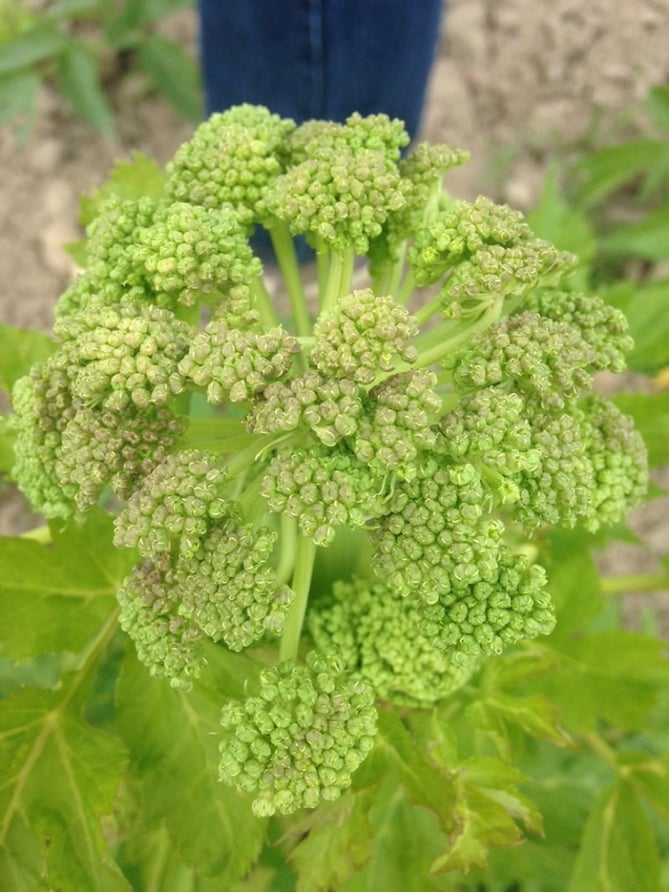
In the realm of herbal products, there are many wild plant species subject to overharvest, misidentification, contamination of other harmful species, and a host of quality control issues. To alleviate some of these problems, Mountain Rose Herbs invested in cultivation projects of certain problem products.
Sometime during the 1970s, herbal industry pioneers collected Echinacea purpurea seeds from wild populations and painstaking efforts were made to cultivate and hand collect every last seed. It took a number of years before enough seed was being produced to grow a substantial crop. Over the following few decades, work with varietal selection and plant breeding was preformed to improve genetics, constituent levels, and yields. This idea of domesticating and improving plants is something that humans have been doing since the advent of agriculture.
Bringing a wild species into cultivation might sound easy - simply find the seed and plant a field, right? Specialty seed companies like Horizon Herbs might have the species you’re looking for, but more than likely you will have to find and collect your own seed. With seed stock in hand, doing experimental plantings is often necessary to ensure the right growing conditions, and determine if yields justify the expense of cultivation. Those “trial” crops are carefully tended in hopes of gaining seed or root stock for expansion the following year. For plants that are difficult to propagate, it might take years of repeating this process until substantial sizable scale is obtained.
Many “domestication” efforts are still in the R&D phases, while other projects are just now justified because of dwindling wild populations or global increased demand. Cultivation also offers controlled environments where species purity exists, harvest is more sanitary, and pure raw material is the result. That’s not to demean wild harvested material or those collectors who go to great lengths to ensure a quality product that’s produced in a sustainable manner. However, with harvest of large volumes of material, the quality and sustainability can become compromised.
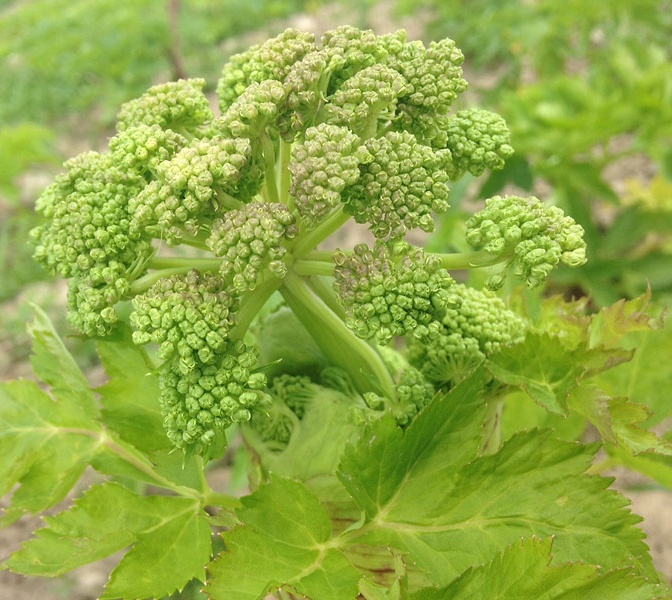
For these reasons, Mountain Rose Herbs decided to develop herb cultivation projects. Our newest success is cultivated Angelica archangelica root. This spring, we began offering the cultivated Angelica root from a project in Europe. While the organic certification was not obtained until just after harvest occurred, you can rest assured that our current material was cultivated with organic farming practices, free of pesticides, and we will be receiving certified organic crops with the next harvest from both our European and US farms!
You might ask, “so what’s the big deal with cultivated?” Glad you asked! Angelica archangelica is in the Apiaceae or Umbelliferae family (having umbrella like flowering heads) and is easily mistaken for similar looking species like Poison Hemlock (Conium maculatum) and Water Hemlock (Cicuta virosa). Aerial plant portions might be identifiable when in seed to highly experienced wild harvesters, but the root portion is most often harvested in late fall or early spring making identification nearly impossible. For this reason we rely on highly accurate scientific testing to confirm species of all of our wild harvested herbs (same goes for our cultivated herbs too).
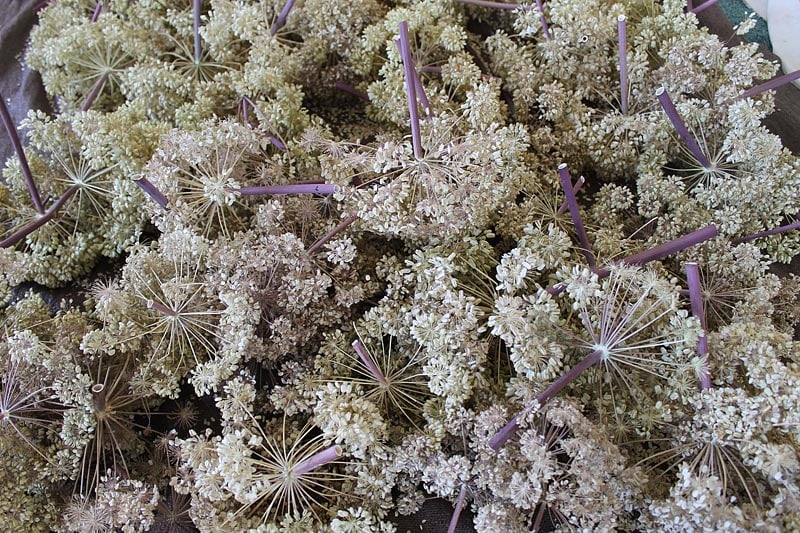
Another profoundly successful cultivation project we've been anticipating is certified organic Osha Root (Ligusticum porter). Albeit in infant stages of production with very small quantities, we are excited to say that it will be available on our website soon. This prized herb grows very slowly at extremely high elevations up to 11,500 ft above sea level. It takes a minimum of 4 years of growth until harvest can be justified in cultivated settings. The wild plants are often collected at 7-12 years of age. Osha’s Rocky Mountain habitat range is not limited, but populations are far from prolific, combined with its popularity, it could become a threatened species if cultivation efforts are not established.
Not only is Osha a plant of concern due to population and demand, but correctly identifying it can be difficult. Being part of the extensive Apiaceae family, which contains many other toxic species, it can be easily confused for a poisonous plant much the same as Angelica. Root harvest season rarely affords the seed heads that are essential to properly identifying this plant. In this instance, cultivation ensures both sustainability and safety.
You can read more about Mountain Rose Herbs's support of the Osha Sustainability Study from our friends at AHPA.
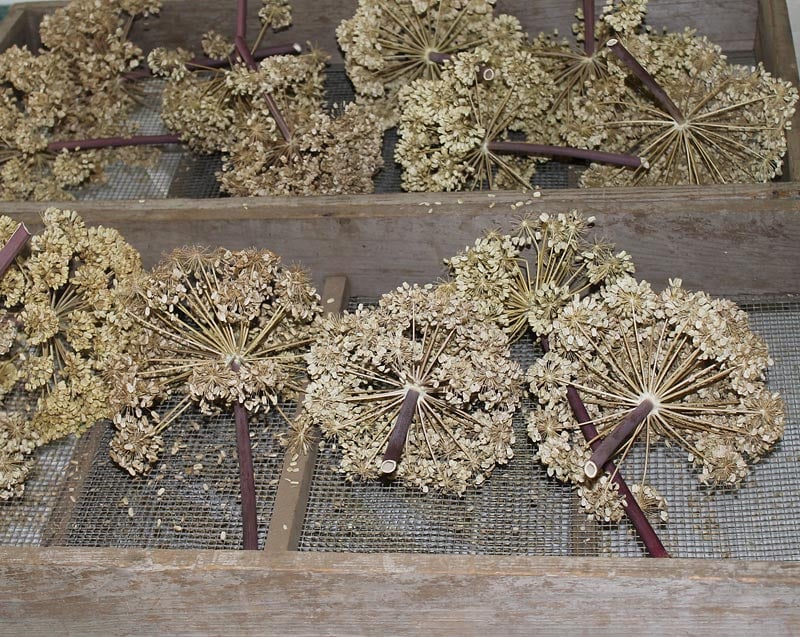
The quality and freshness of our material is assured with quick farm production turnaround. It could take weeks or months for wild harvested material to be collected and consolidated, but a farmed crop is harvested all at once from a single location, ensuring quick transit and often means a fresher product for our customers.
All of us at Mountain Rose believe strongly in the deep tradition of wildharvesting herbs and the real economic significance to countless peoples around the globe. When done in a sustainable, ethical, safe, and affordable way there is rarely the motivation to domesticate those plants and processes. However, when one or more of those factors become compromised, we rise to the challenge and explore alternative methods!
You can expect Mountain Rose Herbs to announce other exciting cultivation projects very soon. Stay tuned...
________________________________________________________________________
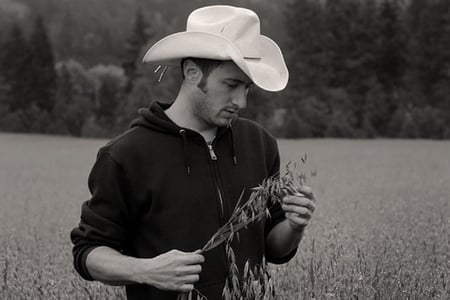
Nate Johnson is our International Farms Manager, bringing a lifelong background in organic farming, especially in the production of dehydrated herbs and spices to Mountain Rose. Growing up at the base of Mount Adams, his life has revolved around agriculture and the outdoors – mainly perusing extreme sports and a country lifestyle. Nate also enjoys multicultural activities with Spanish as his second language.










